Mature Content Advisory
This game is only suitable for individuals 17 years of age or older.
- Site: The Path
- Publisher: Tale of Tales
- Developer: Tale of Tales, TransGaming
- Genre: Adventure
Game Media
By Brad Cook
“Basically, we were asking the question, ‘Would Little Red Riding Hood really avoid meeting the wolf, even after being warned against him?’” wonders Michaël Samyn, who created The Path with Auriea Harvey. “What if ‘Little Red Riding Hood’ was not simply a cautionary tale, but a metaphor for life instead?”

The Path explores those questions by giving us six versions of Little Red Riding Hood, all of them sisters: Robin, an innocent nine-year-old; Rose, who is 11 and wants to protect all living things; 14-year-old tomboy Ginger; Ruby, who is 15 and on the cusp of becoming a young woman; 17-year-old Carmen, who is looking for romance; and Scarlet, the 19-year-old head of the household.
Your goal is to guide each sister, one by one, to grandma’s house. There is but one rule in the game — stay on the path — and it’s meant to be broken. Select a sister from the apartment and begin walking down a path in the middle of a forest. Wander among the trees to collect objects — including 144 coin flowers scattered throughout the map — and find hidden locations to explore. Each sister has a different way of expressing her thoughts about what she sees and collects, as well as who she meets. If she lingers too long in one area, a little girl in a white dress will appear and guide her back to the path.
Eventually, the sister encounters a wolf; after her experience, she finds herself on the path in front of grandma’s house. When she arrives, a first-person sequence takes you through the home; the images you see depend on which sister you had originally selected. Afterward, you return to the apartment, where that sister is no longer present and you can choose a new one. You can also visit grandma’s house without meeting a wolf first, which will result in a different end sequence and the ability to choose that sister again in the apartment.
A Moral For a New Time
Of course, the game’s wolves are not necessarily of the lupine variety, notes Samyn: “We wanted to think about growing up, about exploring, about changing. We wanted to think about relationships, and how they are never as simple as we may wish. We wanted to ask the question if the moral that Charles Perrault attached to the story in the 17th century — that, as a young girl, you should watch out for seductive men because they may have bad intentions — was as straightforward as it seems.”
Harvey muses: “It’s an interesting question whether the six girls could be seen as different stages of a single person’s life. That is an intriguing way to look at the story and will certainly lead to some poignant ideas in the player. The Path is not only about a girl growing into a woman, but also about growing into men, or growth in general.”
She adds: “It could be seen as a reassurance to know that one keeps going, on to the next phase of life, on to the next experience that helps you shed another layer of your innocence. The loss of innocence is tragic but essential to life. So if these bittersweet moments when we change are universal, then the six girls represent man and woman alike.”
How Do You Feel About That?
When asked what themes are expressed in The Path, Samyn replies: “We did not so much choose any themes to explore, as much as we tried to make a tool that allows players to explore those themes themselves. It’s the difference between saying ‘There is danger in the forest!’ and saying ‘Here’s a scary place. Maybe she likes it here. How do you feel about that?’ We hope that allows players to delve deeper into certain subjects than they might otherwise.”
He also notes that such exploration has been part of fairy tales since their inception: “We’ve discovered that these stories do not have an original version. The stories we know have roots in many different times and cultures, and they continue to be retold and reinterpreted to this day. So this idea of continuously morphing the story appealed to us a lot. And we felt we could do credit to these multiple layers through the interactive medium of videogames.”
He adds: “Fairy tales are stories that connect people. Dealing with stories we all know helps us get closer to each other, and, we hope, helps our audience get closer to each other as well. It’s an attempt to connect people, underneath the superficial layer of things that separate us, particularly the things that the media and politicians seem to obsess about.”
View trailers available from Tale of Tales.
Game Hardware
Check out our systems for your best gaming experience.
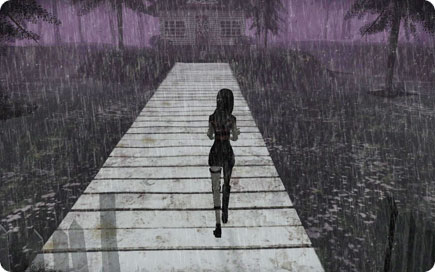
To Grandma’s House We Go. Ruby arrives at Grandma’s house after a harrowing encounter with a wolf.
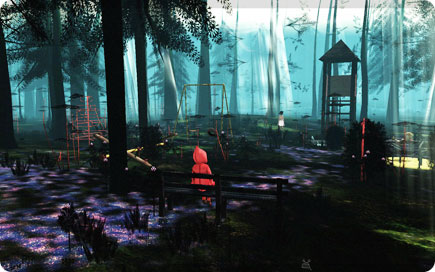
A Place to Rest. Robin stops at the abandoned playground, which holds many secrets.
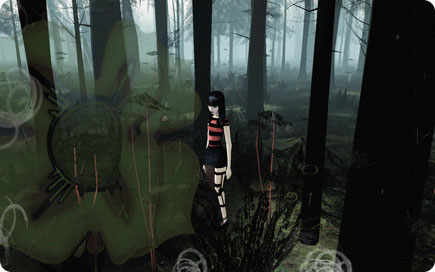
Coin Flower Collecting. Here’s a tip: When you run, you won’t be able to easily see the coin flowers.
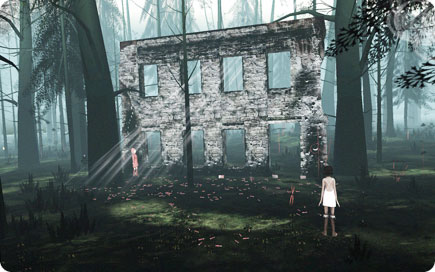
The Girl in White. Linger long enough anywhere and the Girl in White will eventually show up.
If you liked this game, check out:
- A Vampyre Story
- American McGee’s Alice
- Ankh: Heart of Osiris
- BloodRayne
- Jack Keane
- Max Payne
- Riddle of the Sphinx II: The Omega Stone
System Requirements:
- Mac OS X version 10.5.6
- Intel Core Duo processor (2.4 GHz recommended)
- 1GB of RAM
- 583MB hard disk space
- ATI X1600 or Nvidia 7300GT video card
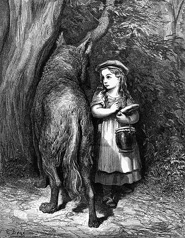
Little Red Through History
Like many fairy tales, the origins of “Little Red Riding Hood” are murky. Oral stories about the dangers of wolves were prevalent throughout Europe, Russia, and other parts of the world for centuries before certain ones were written down and later published. In addition, trickster characters, such as the Norse god Loki, had long been common elements of mythology.
Early versions of “Little Red Riding Hood” depicted the little girl and her grandmother both being eaten by the wolf, with neither rescued from their gruesome fate. That is the story Charles Perrault set down in the 17th century — its moral says, in part: “There are also those [wolves] who are charming, quiet, polite, unassuming, complacent, and sweet, who pursue young women at home and in the streets. And unfortunately, it is these gentle wolves who are the most dangerous ones of all.” That idea helped inspire Samyn and Harvey.
During the 19th century, the Brothers Grimm set down the version we’re familiar with — it ends with a huntsman saving the grandmother and little girl from the wolf’s stomach. They named the heroine Little Red Cap and had her kill the wolf by filling its body with stones. They even wrote a sequel in which the grandmother and Little Red Cap tricked another wolf into falling off the roof of the house and drowning in a trough full of water.
Since then, “Little Red Riding Hood” has been retold, parodied, and referenced in many novels, movies, comic books, videogames, and other media. “We wanted many different interpretations and versions of the story to be present in the game,” says Harvey. “But we didn’t really want to retell the story. We assumed players know it. The game allows them to explore the themes it presents and look at them from many different angles.”
